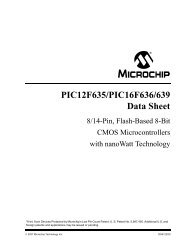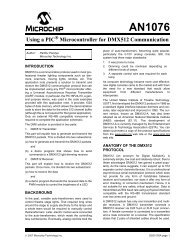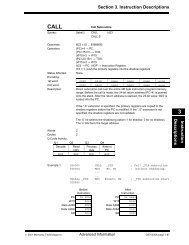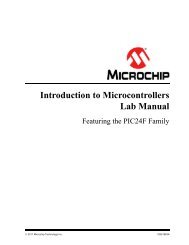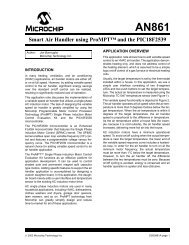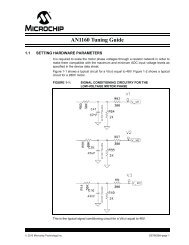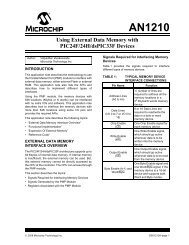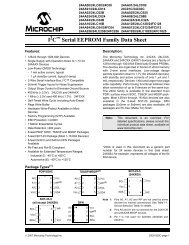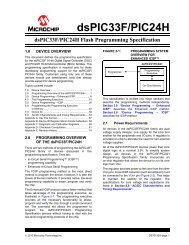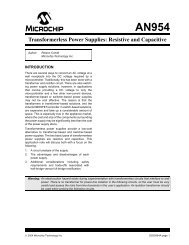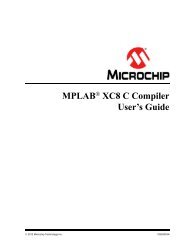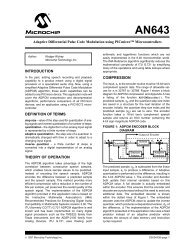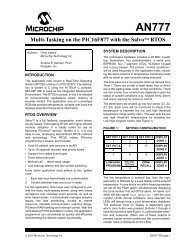MPLAB C Compiler for PIC24 MCUs and dsPIC DSCs ... - Microchip
MPLAB C Compiler for PIC24 MCUs and dsPIC DSCs ... - Microchip
MPLAB C Compiler for PIC24 MCUs and dsPIC DSCs ... - Microchip
Create successful ePaper yourself
Turn your PDF publications into a flip-book with our unique Google optimized e-Paper software.
16-Bit C <strong>Compiler</strong> User’s Guide<br />
TABLE 3-5: WARNING/ERROR OPTIONS IMPLIED BY -WALL (CONTINUED)<br />
-Wmultichar<br />
-Wno-multichar<br />
Option Definition<br />
Warn if a multi-character character constant is used.<br />
Usually, such constants are typographical errors. Since they<br />
have implementation-defined values, they should not be<br />
used in portable code. The following example illustrates the<br />
use of a multi-character character constant:<br />
char<br />
xx(void)<br />
{<br />
return('xx');<br />
}<br />
-Wparentheses Warn if parentheses are omitted in certain contexts, such as<br />
when there is an assignment in a context where a truth value<br />
is expected, or when operators are nested whose<br />
precedence people often find confusing.<br />
-Wreturn-type Warn whenever a function is defined with a return-type that<br />
defaults to int. Also warn about any return statement with<br />
no return-value in a function whose return-type is not void.<br />
-Wsequence-point Warn about code that may have undefined semantics<br />
because of violations of sequence point rules in the C<br />
st<strong>and</strong>ard.<br />
The C st<strong>and</strong>ard defines the order in which expressions in a C<br />
program are evaluated in terms of sequence points, which<br />
represent a partial ordering between the execution of parts of<br />
the program: those executed be<strong>for</strong>e the sequence point <strong>and</strong><br />
those executed after it. These occur after the evaluation of a<br />
full expression (one which is not part of a larger expression),<br />
after the evaluation of the first oper<strong>and</strong> of a &&, ||, ? : or ,<br />
(comma) operator, be<strong>for</strong>e a function is called (but after the<br />
evaluation of its arguments <strong>and</strong> the expression denoting the<br />
called function), <strong>and</strong> in certain other places. Other than as<br />
expressed by the sequence point rules, the order of<br />
evaluation of subexpressions of an expression is not<br />
specified. All these rules describe only a partial order rather<br />
than a total order, since, <strong>for</strong> example, if two functions are<br />
called within one expression with no sequence point between<br />
them, the order in which the functions are called is not<br />
specified. However, the st<strong>and</strong>ards committee has ruled that<br />
function calls do not overlap.<br />
It is not specified, when, between sequence points<br />
modifications to the values of objects take effect. Programs<br />
whose behavior depends on this have undefined behavior;<br />
the C st<strong>and</strong>ard specifies that “Between the previous <strong>and</strong> next<br />
sequence point, an object shall have its stored value<br />
modified, at most once, by the evaluation of an expression.<br />
Furthermore, the prior value shall be read only to determine<br />
the value to be stored.” If a program breaks these rules, the<br />
results on any particular implementation are entirely<br />
unpredictable.<br />
Examples of code with undefined behavior are a = a++;,<br />
a[n] = b[n++] <strong>and</strong> a[i++] = i;. Some more<br />
complicated cases are not diagnosed by this option, <strong>and</strong> it<br />
may give an occasional false positive result, but in general it<br />
has been found fairly effective at detecting this sort of<br />
problem in programs.<br />
DS51284H-page 40 © 2008 <strong>Microchip</strong> Technology Inc.





